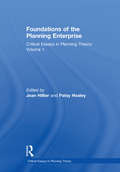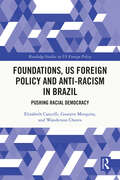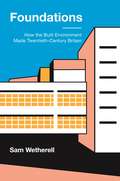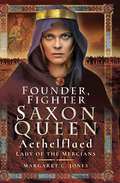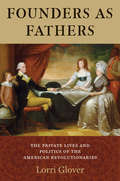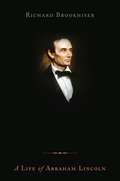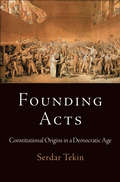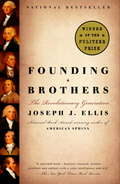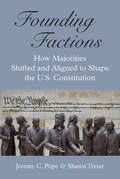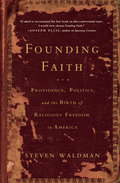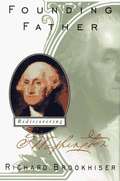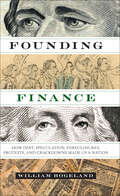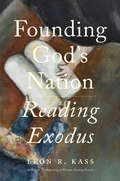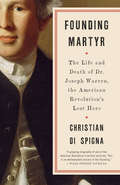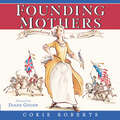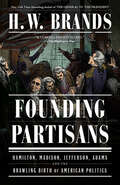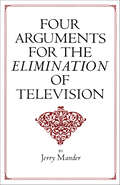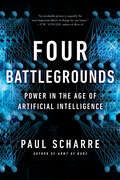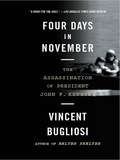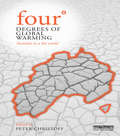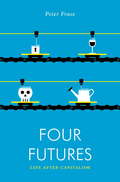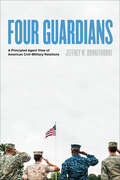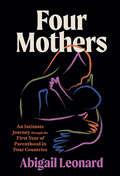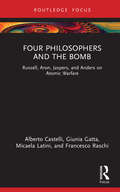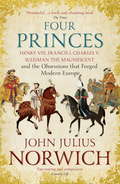- Table View
- List View
Foundations of the Planning Enterprise: Critical Essays in Planning Theory: Volume 1 (Critical Essays in Planning Theory)
by Patsy HealeyPlanning Theory has a history of common debates about ideas and practices and is rooted in a critical concern for the 'improvement' of human and environmental well-being, particularly as pursued through interventions which seek to shape environmental conditions and place qualities.. The first volume in this three volume series, Foundations of the Planning Enterprise, includes articles and papers which offer a unique general introduction to planning theory. The authors review the subject's development, its recurrent themes, its contemporary preoccupation as rational scientific management and its relations to other fields. The editors supplement the collection with an introductory overview as well as detailed introductions to each part. This will be an essential purchase for planning libraries around the world.
Foundations, US Foreign Policy and Anti-Racism in Brazil: Pushing Racial Democracy (Routledge Studies in US Foreign Policy)
by Elizabeth Cancelli Gustavo Mesquita Wanderson ChavesThis book connects the work of US private foundations, the US government, and Brazilian intellectuals to explore how they worked collaboratively to address racial disparities in Brazil during the Cold War. It reveals not only how anti-racism was promoted during this period, shaping the political and academic agenda, but also the importance of American foundations, especially the Rockefeller and Ford Foundations, in the process. Drawing on a vast array of archival and published sources from Brazil, the United States, and around the world, the book investigates the making of transnational connections and networks that sought to respond to the "race problem", seen as an increasingly dangerous threat to the liberal international order. This book is especially relevant to the areas of Race Studies, Social Sciences, Latin-American Studies, Political Science and History, particularly the History of Sociology and Anthropology, as well as to studies about the role of American foundations in the Cold War period. It will also be of interest to activists, social scientists, economists, historians, journalists, NGOs, and INGOs.
Foundations: How the Built Environment Made Twentieth-Century Britain
by Dr Sam WetherellAn urban history of modern Britain, and how the built environment shaped the nation’s politicsFoundations is a history of twentieth-century Britain told through the rise, fall, and reinvention of six different types of urban space: the industrial estate, shopping precinct, council estate, private flats, shopping mall, and suburban office park. Sam Wetherell shows how these spaces transformed Britain’s politics, economy, and society, helping forge a midcentury developmental state and shaping the rise of neoliberalism after 1980.From the mid-twentieth century, spectacular new types of urban space were created in order to help remake Britain’s economy and society. Government-financed industrial estates laid down infrastructure to entice footloose capitalists to move to depressed regions of the country. Shopping precincts allowed politicians to plan precisely for postwar consumer demand. Public housing modernized domestic life and attempted to create new communities out of erstwhile strangers. In the latter part of the twentieth century many of these spaces were privatized and reimagined as their developmental aims were abandoned. Industrial estates became suburban business parks. State-owned shopping precincts became private shopping malls. The council estate was securitized and enclosed. New types of urban space were imported from American suburbia, and planners and politicians became increasingly skeptical that the built environment could remake society. With the midcentury built environment becoming obsolete, British neoliberalism emerged in tense negotiation with the awkward remains of built spaces that had to be navigated and remade.Taking readers to almost every major British city as well as to places in the United States and Britain’s empire, Foundations highlights how some of the major transformations of twentieth-century British history were forged in the everyday spaces where people lived, worked, and shopped.
Founder, Fighter, Saxon Queen: Aethelflaed, Lady of the Mercians
by Margaret C. JonesThe story of the daughter of Alfred the Great, who fought against Viking invaders and ruled a kingdom in the tenth century. Alfred the Great’s daughter defied all expectations of a well-bred Saxon princess. The first Saxon woman ever to rule a kingdom, Aethelflaed, Lady of the Mercians, led her army in battle against Viking invaders. She further broke with convention by arranging for her daughter to succeed her on the throne of Mercia. To protect her people and enable her kingdom in the Midlands to prosper, Aethelflaed rebuilt Chester and Gloucester, and built seven entirely new English towns. In so doing she helped shape our world today. This book brings Aethelflaed’s world to life, from her childhood in time of war to her remarkable work as ruler of Mercia. The final chapter traces her legend, from medieval paintings to novels and contemporary art, illustrating the impact of a legacy that continues to be felt to this day.
Founders as Fathers
by Lorri GloverSurprisingly, no previous book has ever explored how family life shaped the political careers of America's great Founding Fathers--men like George Mason, Patrick Henry, George Washington, Thomas Jefferson, and James Madison. In this original and intimate portrait, historian Lorri Glover brings to life the vexing, joyful, arduous, and sometimes tragic experiences of the architects of the American Republic who, while building a nation, were also raising families. The costs and consequences for the families of these Virginia leaders were great, Glover discovers: the Revolution remade family life no less than it reinvented political institutions. She describes the colonial households that nurtured future revolutionaries, follows the development of political and family values during the revolutionary years, and shines new light on the radically transformed world that was inherited by nineteenth-century descendants. Beautifully written and replete with fascinating detail, this groundbreaking book is the first to introduce us to the founders as fathers.
Founders' Son: A Life of Abraham Lincoln
by Richard BrookhiserAbraham Lincoln grew up in the long shadow of the Founding Fathers. Seeking an intellectual and emotional replacement for his own taciturn father, Lincoln turned to the great men of the founding#151;Washington, Paine, Jefferson#151;and their great documents#151;the Declaration of Independence, the Constitution#151;for knowledge, guidance, inspiration, and purpose. Out of the power vacuum created by their passing, Lincoln emerged from among his peers as the true inheritor of the Founders’ mantle, bringing their vision to bear on the Civil War and the question of slavery. In Founders’ Son, celebrated historian Richard Brookhiser presents a compelling new biography of Abraham Lincoln that highlights his lifelong struggle to carry on the work of the Founding Fathers. Following Lincoln from his humble origins in Kentucky to his assassination in Washington, D. C. , Brookhiser shows us every side of the man: laborer, lawyer, congressman, president; storyteller, wit, lover of ribald jokes; depressive, poet, friend, visionary. And he shows that despite his many roles and his varied life, Lincoln returned time and time again to the Founders. They were rhetorical and political touchstones, the basis of his interest in politics, and the lodestars guiding him as he navigated first Illinois politics and then the national scene. But their legacy with not sufficient. As the Civil War lengthened and the casualties mounted Lincoln wrestled with one more paternal figure#151;God the Father#151;to explain to himself, and to the nation, why ending slavery had come at such a terrible price. Bridging the rich and tumultuous period from the founding of the United States to the Civil War, Founders’ Son is unlike any Lincoln biography to date. Penetrating in its insight, elegant in its prose, and gripping in its vivid recreation of Lincoln’s roving mind at work, this book allows us to think anew about the first hundred years of American history, and shows how we can, like Lincoln, apply the legacy of the Founding Fathers to our times.
Founding Acts: Constitutional Origins in a Democratic Age
by Serdar TekinAll democratic constitutions feature "the people" as their author and ultimate source of legitimacy. They claim to embody the political form that citizens are in some sense supposed to have given themselves. But in what sense, exactly? When does a constitution really or genuinely speak for the people? Such questions are especially pertinent to our present condition, where the voice of "the people" turns out to be irrevocably fragmented, and people themselves want to speak and be heard in their own voices.Founding Acts explores the relationship between constitutional claims of popular sovereignty and the practice of constitution-making in our pluralistic age. Serdar Tekin argues that the process of making a constitution, or its pedigree, is as morally and politically significant as its content. Consequently, democratic constitution-making is not only about making a democratic constitution but also about making it, as much as possible, democratically.Tekin develops two overarching arguments in support of this claim. First, citizen participation in the process of constitution-making is essential to the democratic legitimacy of a new constitution. Second, collective action, that is, the political experience of constructing public life together, is what binds diverse people into a democratic peoplehood. Bringing into dialogue a wide range of canonical and contemporary thinkers, Tekin examines historical realities extending from revolutionary America and France to contemporary South Africa and Germany.
Founding Brothers: The Revolutionary Generation (Pulitzer Prize Winner)
by Joseph J. EllisPULITZER PRIZE WINNER • NATIONAL BESTSELLER • A landmark work of history explores how a group of greatly gifted but deeply flawed individuals—Hamilton, Burr, Jefferson, Franklin, Washington, Adams, and Madison—confronted the overwhelming challenges before them to set the course for our nation.&“A splendid book—humane, learned, written with flair and radiant with a calm intelligence and wit.&” —The New York Times Book ReviewThe United States was more a fragile hope than a reality in 1790. During the decade that followed, the Founding Fathers—re-examined here as Founding Brothers—combined the ideals of the Declaration of Independence with the content of the Constitution to create the practical workings of our government. Through an analysis of six fascinating episodes—Hamilton and Burr&’s deadly duel, Washington&’s precedent-setting Farewell Address, Adams&’ administration and political partnership with his wife, the debate about where to place the capital, Franklin&’s attempt to force Congress to confront the issue of slavery and Madison&’s attempts to block him, and Jefferson and Adams&’ famous correspondence—Founding Brothers brings to life the vital issues and personalities from the most important decade in our nation&’s history.
Founding Factions: How Majorities Shifted and Aligned to Shape the U.S. Constitution
by Jeremy C Pope Shawn TreierThe fundamental importance of the 1787 Constitutional Convention continues to affect contemporary politics. The Constitution defines the structure and limits of the American system of government, and it organizes contemporary debates about policy and legal issues—debates that explicitly invoke the intentions and actions of those delegates to the Convention. Virtually all scholarship emphasizes the importance of compromise between key actors or factions at the Convention. In truth, the deep structure of voting at the Convention remains somewhat murky because the traditional stories are incomplete. There were three key factions at the Convention, not two. The alliance of the core reformers with the slave interests helped change representation and make a stronger national government. When it came time to create a strong executive, a group of small state delegates provided the crucial votes. Traditional accounts gloss over the complicated coalition politics that produced these important compromises, while this book shows the specific voting alignments. It is true that the delegates came with common purposes, but they were divided by both interests and ideas into three crosscutting factions. There was no persistent dominant coalition of reformers or nationalists; rather, there was a series of minority factions allying with one another on the major issues to fashion the compromise. Founding Factions helps us understand the nature of shifting majorities and how they created the American government.
Founding Faith
by Steven WaldmanWith refreshing objectivity, beliefnet. com editor in chief Waldman narrates the real story of how America's Founding Fathers forged a new approach to religious liberty--a revolutionary formula that promoted faith by leaving it alone.
Founding Father: Rediscovering George Washington
by Richard BrookhiserIn this thought-provoking look at George Washington as soldier and statesman, Richard Brookhiser traces the astonishing achievements of Washington's career and illuminates how his character and his values shaped the beginnings of American politics.
Founding Finance: How Debt, Speculation, Foreclosures, Protests, and Crackdowns Made Us a Nation (Discovering America)
by William HogelandThe author of The Whiskey Rebellion “dig[s] beneath history’s surface and note[s] both the populist and anti-populist dimensions of the nation’s founding” (Library Journal).Recent movements such as the Tea Party and anti-tax “constitutional conservatism” lay claim to the finance and taxation ideas of America’s founders, but how much do we really know about the dramatic clashes over finance and economics that marked the founding of America? Dissenting from both right-wing claims and certain liberal preconceptions, Founding Finance brings to life the violent conflicts over economics, class, and finance that played directly, and in many ways ironically, into the hardball politics of forming the nation and ratifying the Constitution—conflicts that still continue to affect our politics, legislation, and debate today.Mixing lively narrative with fresh views of America’s founders, William Hogeland offers a new perspective on America’s economic infancy: foreclosure crises that make our current one look mild; investment bubbles in land and securities that drove rich men to high-risk borrowing and mad displays of ostentation before dropping them into debtors’ prisons; depressions longer and deeper than the great one of the twentieth century; crony mercantilism, war profiteering, and government corruption that undermine any nostalgia for a virtuous early republic; and predatory lending of scarce cash at exorbitant, unregulated rates, which forced people into bankruptcy, landlessness, and working in the factories and on the commercial farms of their creditors. This story exposes and corrects a perpetual historical denial—by movements across the political spectrum—of America’s all-important founding economic clashes, a denial that weakens and cheapens public discourse on American finance just when we need it most.
Founding God’s Nation: Reading Exodus
by Leon R KassIn this long-awaited follow-up to his 2003 book on Genesis, humanist scholar Leon Kass explores how Exodus raises and then answers the central political questions of what defines a nation and how a nation should govern itself. Considered by some the most important book in the Hebrew Bible, Exodus tells the story of the Jewish people from their enslavement in Egypt, through their liberation under Moses&’s leadership, to the covenantal founding at Sinai and the building of the Tabernacle. In Kass&’s analysis, these events began the slow process of learning how to stop thinking like slaves and become an independent people. The Israelites ultimately founded their nation on three elements: a shared narrative that instills empathy for the poor and the suffering, the uplifting rule of a moral law, and devotion to a higher common purpose. These elements, Kass argues, remain the essential principles for any freedom-loving nation today.
Founding Martyr: The Life and Death of Dr. Joseph Warren, the American Revolution's Lost Hero
by Christian Di SpignaA rich and illuminating biography of America’s forgotten Founding Father, the patriot physician and major general who fomented rebellion and died heroically at the battle of Bunker Hill on the brink of revolutionLittle has been known of one of the most important figures in early American history, Dr. Joseph Warren, an architect of the colonial rebellion, and a man who might have led the country as Washington or Jefferson did had he not been martyred at Bunker Hill in 1775. Warren was involved in almost every major insurrectionary act in the Boston area for a decade, from the Stamp Act protests to the Boston Massacre to the Boston Tea Party, and his incendiary writings included the famous Suffolk Resolves, which helped unite the colonies against Britain and inspired the Declaration of Independence. Yet after his death, his life and legend faded, leaving his contemporaries to rise to fame in his place and obscuring his essential role in bringing America to independence.Christian Di Spigna’s definitive new biography of Warren is a loving work of historical excavation, the product of two decades of research and scores of newly unearthed primary-source documents that have given us this forgotten Founding Father anew. Following Warren from his farming childhood and years at Harvard through his professional success and political radicalization to his role in sparking the rebellion, Di Spigna’s thoughtful, judicious retelling not only restores Warren to his rightful place in the pantheon of Revolutionary greats, it deepens our understanding of the nation’s dramatic beginnings.
Founding Mothers: Remembering the Ladies
by Cokie Roberts#1 New York Times bestselling author and celebrated journalist Cokie Roberts brings young readers a stunning nonfiction picture book that highlights the female patriots of the American Revolution. This nonfiction picture book is an excellent choice to share during homeschooling, in particular for children ages 4 to 6. It’s a fun way to learn to read and as a supplement for activity books for children.Beautifully illustrated by Caldecott Honor–winning artist Diane Goode, Founding Mothers: Remembering the Ladies reveals the incredible accomplishments of the women who orchestrated the American Revolution behind the scenes.Roberts traces the stories of heroic, patriotic women such as Abigail Adams, Martha Washington, Phillis Wheatley, Mercy Otis Warren, Sarah Livingston Jay, and others. Details are gleaned from their letters, private journals, lists, and ledgers. The bravery of these women’s courageous acts contributed to the founding of America and spurred the founding fathers to make this a country that “remembered the ladies.”This compelling book, based on the author's acclaimed work for adults, Founding Mothers, includes a rich time line, biographies, an author’s note, and additional web resources in the back matter. Parents and educators looking for a more in-depth book beyond the Rosie Revere and Rad Women series will welcome Founding Mothers.
Founding Partisans: Hamilton, Madison, Jefferson, Adams and the Brawling Birth of American Politics
by H. W. BrandsFrom bestselling historian and Pulitzer Prize finalist H.W. Brands, a revelatory history of the shocking emergence of vicious political division at the birth of the United States.To the framers of the Constitution, political parties were a fatal threat to republican virtues. They had suffered the consequences of partisan politics in Britain before the American Revolution, and they wanted nothing similar for America. Yet parties emerged even before the Constitution was ratified, and they took firmer root in the following decade. In Founding Partisans, master historian H. W. Brands has crafted a fresh and lively narrative of the early years of the republic as the Founding Fathers fought one another with competing visions of what our nation would be.The first party, the Federalists, formed around Alexander Hamilton, James Madison and their efforts to overthrow the Articles of Confederation and make the federal government more robust. Their opponents organized as the Antifederalists, who feared the corruption and encroachments on liberty that a strong central government would surely bring. The Antifederalists lost but regrouped under the new Constitution as the Republicans, led by Thomas Jefferson, whose bruising contest against Federalist John Adams marked the climax of this turbulent chapter of American political history. The country&’s first years unfolded in a contentious spiral of ugly elections and blatant violations of the Constitution. Still, peaceful transfers of power continued, and the nascent country made its way towards global dominance, against all odds. Founding Partisans is a powerful reminder that fierce partisanship is a problem as old as the republic.
Four Arguments for the Elimination of Television
by Jerry Mander“Persuasive . . . interesting and unusual.” —Kirkus ReviewsA total departure from previous writing about television, this book is the first ever to advocate that the medium is not reformable. Its problems are inherent in the technology itself and are so dangerous—to personal health and sanity, to the environment, and to democratic processes—that TV ought to be eliminated forever.Weaving personal experiences with meticulous research, the author ranges widely over aspects of television that have rarely been examined and never before joined together, allowing an entirely new, frightening image to emerge. The idea that all technologies are neutral, benign instruments that can be used well or badly is thrown open to profound doubt. Speaking of TV reform is, in the words of the author, “as absurd as speaking of the reform of a technology such as guns.”Praise for the work of Jerry Mander“Lively, provocative.” —Publishers Weekly“A skilled writer.” —Kirkus Reviews (starred review)
Four Battlegrounds: Power In The Age Of Artificial Intelligence
by Paul ScharreAn NPR 2023 "Books We Love" Pick One of the Next Big Idea Club's Must-Read Books "An invaluable primer to arguably the most important driver of change for our future." —P. W. Singer, author of Burn-In An award-winning defense expert tells the story of today’s great power rivalry—the struggle to control artificial intelligence. A new industrial revolution has begun. Like mechanization or electricity before it, artificial intelligence will touch every aspect of our lives—and cause profound disruptions in the balance of global power, especially among the AI superpowers: China, the United States, and Europe. Autonomous weapons expert Paul Scharre takes readers inside the fierce competition to develop and implement this game-changing technology and dominate the future. Four Battlegrounds argues that four key elements define this struggle: data, computing power, talent, and institutions. Data is a vital resource like coal or oil, but it must be collected and refined. Advanced computer chips are the essence of computing power—control over chip supply chains grants leverage over rivals. Talent is about people: which country attracts the best researchers and most advanced technology companies? The fourth “battlefield” is maybe the most critical: the ultimate global leader in AI will have institutions that effectively incorporate AI into their economy, society, and especially their military. Scharre’s account surges with futuristic technology. He explores the ways AI systems are already discovering new strategies via millions of war-game simulations, developing combat tactics better than any human, tracking billions of people using biometrics, and subtly controlling information with secret algorithms. He visits China’s “National Team” of leading AI companies to show the chilling synergy between China’s government, private sector, and surveillance state. He interviews Pentagon leadership and tours U.S. Defense Department offices in Silicon Valley, revealing deep tensions between the military and tech giants who control data, chips, and talent. Yet he concludes that those tensions, inherent to our democratic system, create resilience and resistance to autocracy in the face of overwhelmingly powerful technology. Engaging and direct, Four Battlegrounds offers a vivid picture of how AI is transforming warfare, global security, and the future of human freedom—and what it will take for democracies to remain at the forefront of the world order.
Four Days in November: The Assassination Of President John F. Kennedy
by Vincent Bugliosi"A book for the ages."--?Los Angeles Times Book Review Four Days in November is an extraordinarily exciting, precise, and definitive narrative of the assassination of President John F. Kennedy on November 22, 1963, by Lee Harvey Oswald. It is drawn from Reclaiming History: The Assassination of President John F. Kennedy, a huge and historic account of the event and all the conspiracy theories it spawned, by Vincent Bugliosi, famed prosecutor of Charles Manson and author of Helter Skelter. For general readers, the carefully documented account presented in Four Days is utterly persuasive: Oswald did it and he acted alone.
Four Degrees of Global Warming: Australia in a Hot World
by Peter ChristoffAt Copenhagen in December 2009, the international community agreed to limit global warming to below two degrees Celsius to avoid the worst impacts of human-induced climate change. However climate scientists agree that current national emissions targets collectively will still not achieve this goal. Instead, the ‘ambition gap’ between climate science and climate policy is likely to lead to average global warming of around four degrees Celsius by or before 2100. If a ‘Four Degree World’ is the de facto goal of policy, we urgently need to understand what this world might look like. Four Degrees of Global Warming: Australia in a Hot World outlines the expected consequences of this world for Australia and its region. Its contributors include many of Australia’s most eminent and internationally recognized climate scientists, climate policy makers and policy analysts. They provide an accessible, detailed, dramatic, and disturbing examination of the likely impacts of a Four Degree World on Australia’s social, economic and ecological systems. The book offers policy makers, politicians, students, and anyone interested climate change, access to the most recent research on potential Australian impacts of global warming, and possible responses.
Four Futures: Life After Capitalism (Jacobin)
by Peter FraseCapitalism is going to endPeter Frase argues that increasing automation and a growing scarcity of resources, thanks to climate change, will bring it all tumbling down. In Four Futures, Frase imagines how this post-capitalist world might look, deploying the tools of both social science and speculative fiction to explore what communism, rentism, socialism and exterminism might actually entail.Could the current rise of real-life robocops usher in a world that resembles Ender's Game? And sure, communism will bring an end to material scarcities and inequalities of wealth--but there's no guarantee that social hierarchies, governed by an economy of "likes," wouldn't rise to take their place. A whirlwind tour through science fiction, social theory and the new technologies already shaping our lives, Four Futures is a balance sheet of the socialisms we may reach if a resurgent Left is successful, and the barbarisms we may be consigned to if those movements fail.From the Trade Paperback edition.
Four Guardians: A Principled Agent View of American Civil-Military Relations
by Jeffrey W. DonnithorneExploring the profound differences between what the military services believe—and how they uniquely serve the nation.When the US military confronts pressing security challenges, the Army, Navy, Air Force, and Marine Corps often react differently as they advise and execute civilian defense policies. Conventional wisdom holds that these dynamics tend to reflect a competition for prestige, influence, and dollars. Such interservice rivalries, however, are only a fraction of the real story. In Four Guardians, Jeffrey W. Donnithorne argues that the services act instead as principled agents, interpreting policies in ways that reflect their unique cultures and patterns of belief. Chapter-length portraits of each service highlight the influence of operational environment ("nature") and political history ("nurture") in shaping each service's cultural worldview. The book also offers two important case studies of civil-military policymaking: one, the little-known story of the creation of the Rapid Deployment Joint Task Force in the early 1980s; the other, the four-year political battle that led to the passage of the Goldwater-Nichols Act in 1986. Donnithorne uses these cases to demonstrate the principled agent framework in action while amply revealing the four services as distinctly different political actors. Combining crisp insight and empirical depth with engaging military history, Four Guardians provides practical utility for civil-military scholars, national security practitioners, and interested citizens alike. This timely work brings a new appreciation for the American military, the complex dynamics of civilian control, and the principled ways in which the four guardian services defend their nation.
Four Mothers: An Intimate Journey through the First Year of Parenthood in Four Countries
by Abigail LeonardAbigail Leonard's page-turning narrative of four real women—Anna from Finland, Tsukasa from Japan, Sarah from the U.S., and Chelsea from Kenya—is a "deeply personal look at women worldwide grappling with the best and worst moments of their first year... eye-opening and cathartic, this is a love letter to parents and a clarion call for better policy.&” (Eve Rodsky, New York Times-bestselling author of Fair Play) Tsukasa in Japan grapples with memories of a difficult childhood as she tries to chart a new, healthier path for her own daughter while balancing onerous cultural expectations. Chelsea in Kenya endures a devastating loss just before she gives birth and finds that without the traditional support of previous generations, motherhood can be grueling – but it can also provide emotional healing. Anna in Finland navigates a complicated relationship with her child&’s father, but the country&’s robust family policies allow her to still pursue the kind of parenthood that she envisioned. Sarah in the US leaves the religious community that raised her in order to create a less traditional family of her own only to find she&’s largely confronting motherhood alone. Utterly moving and propulsively readable from page one, Leonard interweaves these stories with a critically researched exploration of how parental support programs evolved in each country—and why some provide more help than others. As nations around the world debate programs like paid leave, universal daycare, reproductive healthcare, and family tax incentives, Four Mothers offers a uniquely intimate, moving portrait of what those policies mean for parents on the ground—and considers what modern families really want.
Four Philosophers and the Bomb: Russell, Aron, Jaspers, and Anders on Atomic Warfare (Routledge Studies in Social and Political Thought)
by Alberto Castelli Giunia Gatta Micaela Latini Francesco RaschiIn this book, Alberto Castelli, Giunia Gatta, Micaela Latini, and Francesco Raschi examine how four prominent intellectuals of the 20th century (Bertrand Russell, Karl Jaspers, Raymond Aron, and Günther Anders) understood atomic warfare. With a chapter devoted to the philosophical ideas of each thinker and how they understood and interpreted war, the authors analyze the historic-political context in which these ideas emerged and what they proposed to avoid a nuclear disaster.Four Philosophers and the Bomb will be of interest to students and researchers of peace studies, international relations, political philosophy, and moral philosophy.
Four Princes: Henry VIII, Francis I, Charles V, Suleiman the Magnificent and the Obsessions that Forged Modern Europe
by John Julius Norwich'Never before had the world seen four such giants co-existing. Sometimes friends, more often enemies, always rivals, these four men together held Europe in the hollow of their hands.' Four great princes - Henry VIII of England, Francis I of France, Charles V of Spain and Suleiman the Magnificent - were born within a single decade. Each looms large in his country's history and, in this book, John Julius Norwich broadens the scope and shows how, against the rich background of the Renaissance and destruction of the Reformation, their wary obsession with one another laid the foundations for modern Europe. Individually, each man could hardly have been more different - from the scandals of Henry's six wives to Charles's monasticism - but, together, they dominated the world stage. From the Field of the Cloth of Gold, a pageant of jousting, feasting and general carousing so lavish that it nearly bankrupted both France and England, to Suleiman's celebratory pyramid of 2,000 human heads (including those of seven Hungarian bishops) after the battle of Mohács; from Anne Boleyn's six-fingered hand (a potential sign of witchcraft) that had the pious nervously crossing themselves to the real story of the Maltese falcon, Four Princes is history at its vivid, entertaining best. With a cast list that extends from Leonardo da Vinci to Barbarossa, and from Joanna the Mad to le roi grand-nez, John Julius Norwich offers the perfect guide to the most colourful century the world has ever known and brings the past to unforgettable life.
